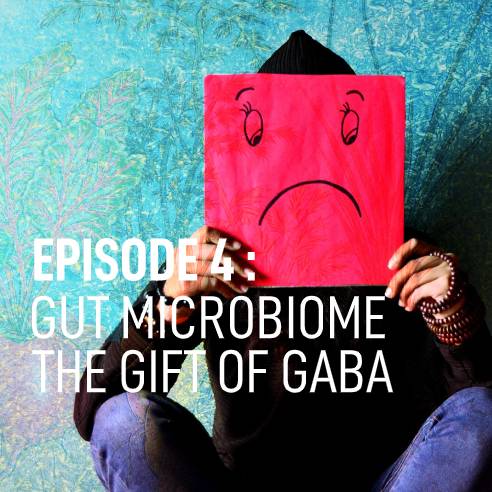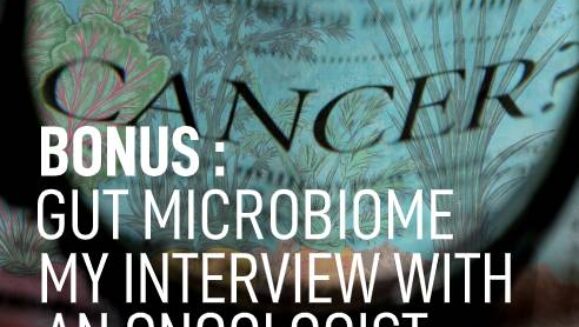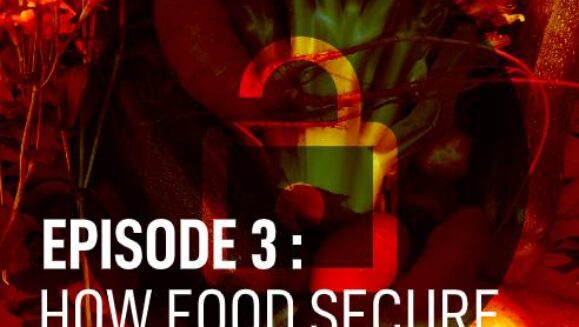Today we’re talking about the Gut Microbiome and The Gift of GABA. (G-A-B-A)
Listen in here :
If you’re trying to avoid catching the coronavirus, you’re also probably thinking about ways you can boost your immunity and/or deal with your stress and anxiety regarding the unknown – without panicing. These are stressful times and the one thing we all need right now is peace of mind. Can I get a witness?
Before we get into what GABA is, let me tell you of some of the symptoms of low levels of GABA in the body…anxiety, feeling sleepless, heart palpitations, cold hands and feet, trouble relaxing, and feeling overwhelmed. Many of us are feeling one, some or all of these things as a result of the recent events related to how the coronavirus is impacting our jobs, our lives, our food hoarding – yet we’re likely feeling undernourished and overstimulated amid the unending news cycle on COVID-19.
So in this episode, we’re going to dive into one question that is very concerning….because when people have increased struggles in life and things get more complicated, when people lose work aka their incomes, when people lose family members to illness and death
We have increased levels of stress!
Cortisol levels rise and anxiety, depression and even PTSD can take hold and can be consuming….so….
What foods help restore healthy GABA levels to the gut microbiome and help protect us all from the outcomes of anxiety and depression?
And that’s what we’re going to wrap our brains around today.
First off, what is GABA?
GABA technically speaking is gamma-aminobutyric acid. It’s an inhibitory neurotransmitter in mature adult humans and its role is to limit neuronal excitability in the central nervous system.
GABA blocks neurological impulses that can be responsible for triggering stress, PTSD, depression and anxiety. So it makes sense that decreased levels of GABA in humans are linked to these mental states. However, sufficient levels of GABA makes us feel calm. GABA is the precursor to serotonin – which is a chemical in the brain that helps us sleep. When the body produces serotonin aka “the happy chemical”, it contributes to our wellbeing.
There are GABAa and GABAb receptors in the brain…this is technical, but what we need to know is that GABAa receptors are the one largely responsible for inhibiting excitability in the nervous system…
If up until now, you didn’t know what was…you’re not alone. I didn’t either until I interviewed an Oncologist at UCSF recently, who has also done extensive research on the gut microbiome, specifically as it relates to colorectal cancer in diverse communities and she mentioned GABA….and I was like “what is GABO?”
Anyway, that interview will be available for your listening pleasure in a few days on foodslain.com
And will be available to my Patreon supporters even sooner, so if you want to get in on the early bonus content release, head on over to Patreon and support this show. And I’m not asking anyone to give me something for nothing..you can check out the tiers and goodies I have posted there. Shout out to all my Patreon supporters!!! Laurette, Carol and Michele – Thank you…It’s only a handful of loyal listeners right now, but we all gotta start somewhere, right? Join these amazing folks in the effort to help us all clean up the food supply chain.
And if you’re not into Patreon but still want to show me some love and make a one time donation..And a BIG thank you to all the folks who have donated! Also, a quick shout out to Karimah who purchased 7 packets of seeds that I saved from crops last year.
Ok, so back to the lecture at hand….ain’t nuthin but a G thang…baby..
How does GABA affect our health?
GABA is produced in the insulin producing bCells in the pancreas in large quantities and can have an effect on our body’s ability to produce a peptide hormone called glucagon, which in short helps to stabilize blood glucose levels – which has an impact on people with diabetes.
GABA also plays a role in our immunity because GABA receptors help suppress the inflammatory immune responses.
Lastly, GABA receptors exist throughout the gastrointestinal tract…one very interesting study I came across cited that GABAb receptors have the potential ability to inhibit GI carcinogenesis and tumor growth.
Furthermore, food is a direct modulator of gut microbiota, eventually establishing a ménage à trois among the diet, gut microbiota, and brain. These relations are even more complex considering that hormones, in particular steroid hormones, can influence the gut microbiota and, in turn, the gut microbiota can influence hormone levels. Furthermore, some extensive contaminants, such as the endocrine disruptors in like BPAs, may influence the gut bacteria composition.
So, there’s all that. It’s clear that GABA (and the absence of it) is really important not only to our health regarding our immune response, but also to our gut health and our mental health.
Mental health is a HUGE issue in this country, and it’s also a very expensive one.
As tax payers, we spend $99 billion on mental health services and we barely scratch the surface of helping as many people who are in need of services…
What’s more, we spend $136 BILLION on gastrointestinal health costs, which is more than we spend on heart disease. Clearly, from an economic standpoint, the costs are out of control…
Another thing to note…which is very serious…Suicidal behavior and its consequences are major public health issues for our society. In 2007, suicide ranked as the 11th leading cause of death in the United States and was responsible for 34 598 deaths. Suicide is influenced by medical, psychological, social, cultural, and economic factors.
Business cycles may affect suicide rates, although different age groups responded differently.
Our findings suggest that public health responses are a necessary component of suicide prevention during recessions.
An economic crisis is the state of affairs provoked by a sudden and severe economic recession. Most recessions in history have been mild. An economic recession is characterized by rising unemployment and falling gross domestic product. In contrast with the scant suicide studies targeting economic crisis, an extensive literature exists on the association between suicide and unemployment. The study of the association between suicide and unemployment can be traced back to Durkheim, who stated that unemployment weakens a person’s social integration and increases suicide risk.
How GABA works with the gut microbiome?
Things start with the Vagus nerve. The vagus nerve, also referred to as the pneumogastric nerve, and it interacts with the parasympathetic control of the heart, lungs, and digestive tract.
Our parasympathetic nervous system is responsible for stimulating bodily functions that include sexual arousal, salivation, urination, digestion and defecation, control of mood, immune response, digestion, and heart rate.
There’s a two way communication between the brain and the gastrointestinal tract, “brain–gut axis,” and it is based on a complex system, that includes the vagus nerve, but also includes the sympathetic nervous system, endocrine and immune systems. The key here is how the connection between the gut microbiota regulates gastrointestinal homeostasis and connects emotional and cognitive areas of the brain with gut functions.
What are the specific foods that cause GABA deficiencies?
Fried foods – due to the saturated fats
Alcohol – hard alcohol, not necessarily red wine
Meat – especially processed meats
Refined foods – sugar, flours
Foods that restore GABA aka dietary neurotransmitters?
First of all…GABA naturally occurs in PLANTS! Duh….
But you can also get GABA in fermented foods.
- Vegetables – kimchi/sauerkraut, fermented garlic, leeks
- Drinks – Kombucha, tepache, milk kefir, water kefir
- Yogurt
Other foods…
- Brassicas
- Mushrooms – contain selenium, B vitamins, copper and antioxidants
- Oats
- Beans
- Stinging nettles (one of my faves)
- Radishes
- Peas
Anti-inflammatory foods
- Fresh turmeric
- Berries (anthocyanins)
- Small fatty fish (sardines) low mercury
- Green tea – EGCG helps reduce cytokine production to minimize damage to fatty acids in cells
So…the key takeaway here is…
the gift of GABA exists in the food we consume. Reduced GABA levels are directly connected to the foods we consume as well as to the levels of stress we have in our lives. These are tricky times right now, so I encourage you as much as you can to give yourself the gift of GABA…to help balance your gut microbiota, strengthen your immunity, help you feel calm amidst the storm of all the things going on in the world around you, so that you can be of good mental and physical health at one of the most important times.
So that’s where I’m going to leave this one. We need you! You need you. Your family needs you…Let’s get to GABA! Let’s stay calm in the eye of the storm. Let’s keep each other healthy in mind and body.
In April, I’ll be releasing my plant centric restoration book, that will contain a bunch of great recipes that you can enjoy and increase those GABA levels. In fact, if you head over to foodslain.com right now and sign up for my newsletter, I’ll be sending out some free recipes to people on that list.
Remember you can also support this show in 4 ways. Join other supporters on Patreon, make a one-time donation or purchase some seeds from the website and listen in and share these episodes with people you love. And if you feel it, leave a review.
Listen in to the bonus interview with the Oncologist this week, and next week, we’ll be talking about that Avocado toast. Though avocados are great for a lot of things, what they go through within our food supply chain is eye opening. So, tune in for that.
That said, eat clean, eat healthy and love your food. I’ll see you on the other side of the plate. Chow!



